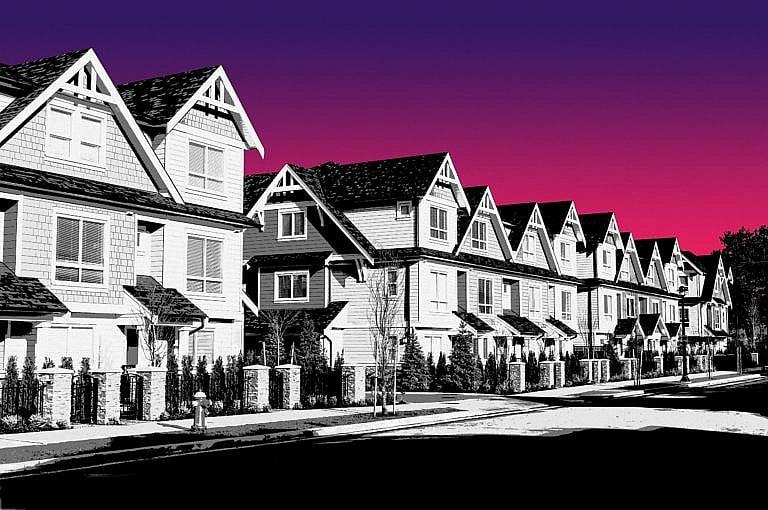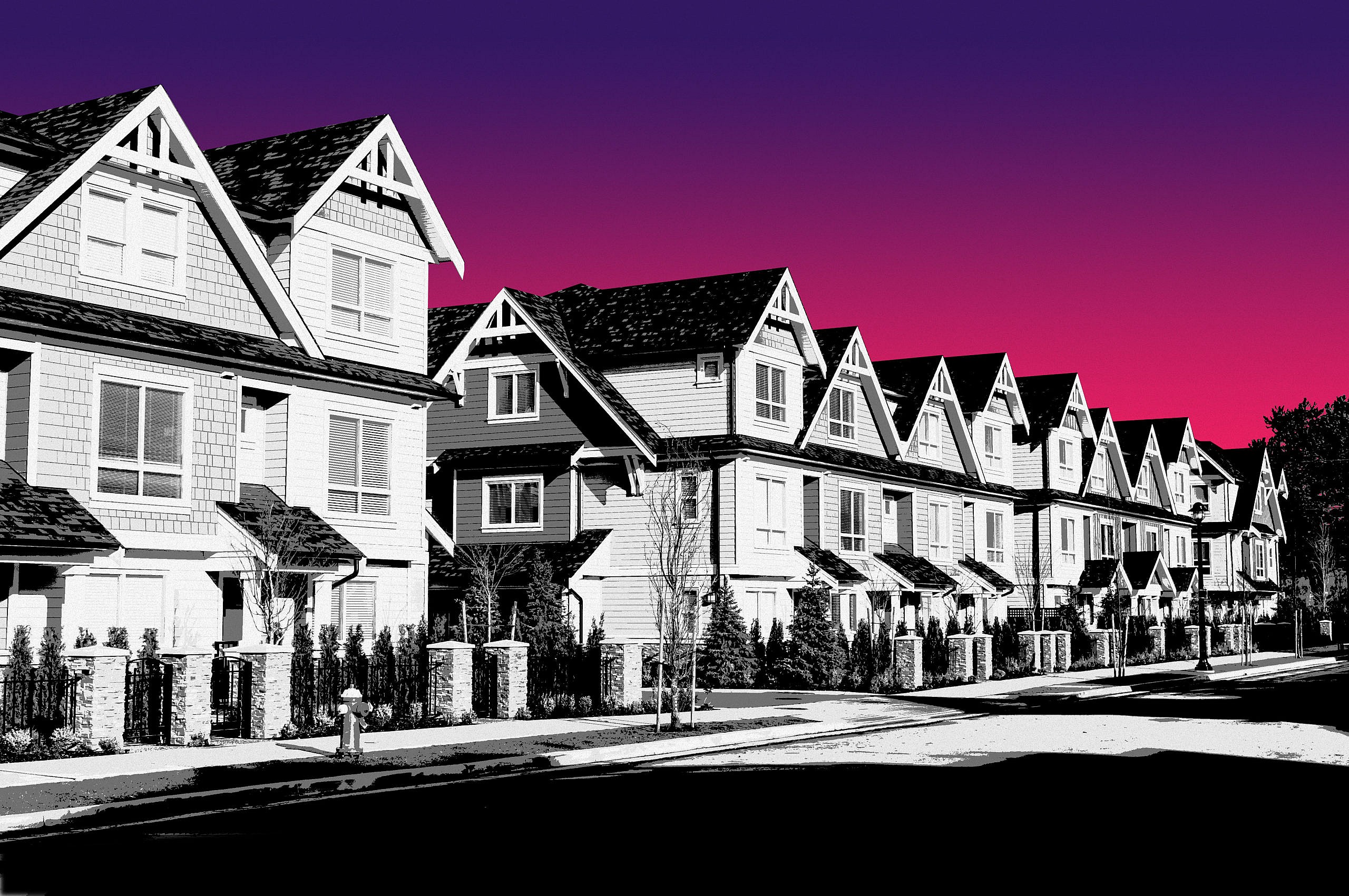Our mortgage payments went up to more than $3,300 a month
It feels like we did everything right. And yet we can barely afford to start a family.

(Photo by iStock, Illustration by Maclean’s)
Share

In the summer of 2020, I was living in a three-bedroom house in Coquitlam, B.C., with my parents, my brother and my partner, Curtis. The rent was $3,000 a month, and split between all of us, it was affordable: Curtis and I only paid $250 each. It was nice living with family, but by that point, we’d done it for three years and were nearing the end of our 20s. In August, Curtis and I started to think about buying a place of our own. We wanted to start a family and adopt a dog, which we couldn’t do as renters.
We started saving up for a down payment, with a goal of setting aside $50,000. Curtis is a heavy-duty mechanic and I work as a coordinator at a university. Together, we earn a combined $165,000—a solid income for a young couple. Luckily, Curtis had been putting away money in his RRSPs for about a decade—a total of $40,000—which gave us a good head start.
In January of 2021, we started house-hunting in suburbs east of Vancouver. Our budget was around $550,000 and our bank approved us for a $700,000 mortgage. We were looking for a spacious apartment or townhouse between Burnaby and Langley where Curtis and I work, respectively. We hoped the extra bedrooms could be used to host family and guests, and one day, serve as our kids’ bedrooms.
In August 2021, after seeing more than 20 homes, we bought a three-bed, three-bath townhouse in Pitt Meadows for $631,000. We could either go with a variable mortgage at 1.35 per cent or a fixed mortgage at 2.1 per cent. Our mortgage broker and financial adviser both suggested we go with the variable rate. They were convinced that interest rates would stay low: they hadn’t spiked in 25 years, and Tiff Macklem, the governor of the Bank of Canada, said himself that interest rates would stay low for “a long time.” We decided on a variable mortgage at 1.35 per cent, which started at $2,421 a month.
Things started off well for us. To save money, we did home renovations ourselves: we replaced carpets with vinyl; painted the ceilings, stairs, window frames, doors and cabinets; replaced the lights; installed new baseboards, fire detectors and a kitchen backsplash. The renovations cost us less than $10,000—Curtis got a discount on paint and other supplies through work. When it came to daily spending, we didn’t track our expenses or set a budget. We ate out a couple of times a week. We took our family out to the movies once a month, which usually cost $150, between dinner, tickets and snacks. Curtis and I both played in a spring hockey league, paying $500 each, and Curtis regularly brewed beer, spending about $50 a month on supplies.
In June of 2022, Curtis and I took a trip to Greece, where he proposed. It felt like our lives were moving in the right direction, but back home, interest rates were rising. We were told by our financial adviser that rates would go up by 0.25 per cent, but the jumps were much higher—by June, rates were already up by one per cent. We were frustrated with our advisers and terrified that our mortgage would spiral out of control.
By October, our payments rose to $3,229 a month. Curtis and I worried about our financial future. We travelled a lot in our 20s, backpacking in Europe, attending a wedding in Australia, watching Cirque du Soleil in Vegas. But now we had to question whether we could even afford to travel, given how much of our paycheque was going toward the mortgage. What if this gets out of control and we lose the house? We were on our own—our family couldn’t afford to bail us out if we needed it. We started wondering what our lives would be like as house-poor parents, unable to afford sports or extracurriculars for future kids. We wanted to start a family, but spending an extra $800 a month—or $9,600 a year—on mortgage payments was pretty much obliterating those plans. It was a tough pill to swallow.
I wasn’t eating or sleeping properly. I constantly checked the mortgage rates, read financial news and listened to podcasts on Canadian economics. It was all I could talk about with friends and family. Curtis was a lot more laid-back than me. If it came down to it, he figured he could use his handyman skills—operating heavy-duty machinery or painting homes—to earn some extra cash.
In December, Curtis and I decided to switch to a fixed rate, at 5.14 per cent, for about $3,340 a month for the next five years. We needed to put a stop to the anxiousness we felt, even if rates began to drop the next day. In early 2022, the Bank of Canada held the interest rate steady at 4.5 per cent, pretty much right after we switched to a fixed rate. Either way, we were happy to have a bit of stability.
RELATED: My mortgage is about to go up by at least $1,000 a month
We’ve had to curb our spending significantly. We buy our groceries wholesale and often in bulk, and try to buy used clothes and furniture. I used to drive to work three days a week but it was costing me $500 a month on gas and insurance, so now I take two buses and a Skytrain. A friend moved into one of our extra bedrooms and pays us $550 a month. We’re much stricter about our budgeting. At the start of the month, we use our first paycheques to pay off our property tax, internet, electricity and other bills along with half of our mortgage. Our second paycheques go toward the rest of the mortgage, savings and a little bit of personal spending. We each spend about $150 a month, which I normally put toward home appliances, gifts or leisure activities. Before, we spent between $300 and $400 a month each on ourselves. Instead of jetting off to Greece, we’ll be doing a lot more camping in B.C., at sites like Cultus Lake and Porteau Cove, this year. My father renovated an old sailboat, which we’ll take over to Victoria and up around Vancouver Island this summer.
Our goal is to save $20,000 before starting a family, to supplement my maternity leave and Curtis’s paternity leave. But because so much of our money goes toward our mortgage, we’ve only saved about $5,000. It’ll take another year of saving to get to our mark. We wanted to get married in 2024, but those plans have been pushed back indefinitely.
It feels like we did everything right—saved up for a down payment, pursued stable careers, purchased a home, did the renovations ourselves. And yet we can barely afford to start a family. Our lives completely revolve around our mortgage.
—As told to Mathew Silver